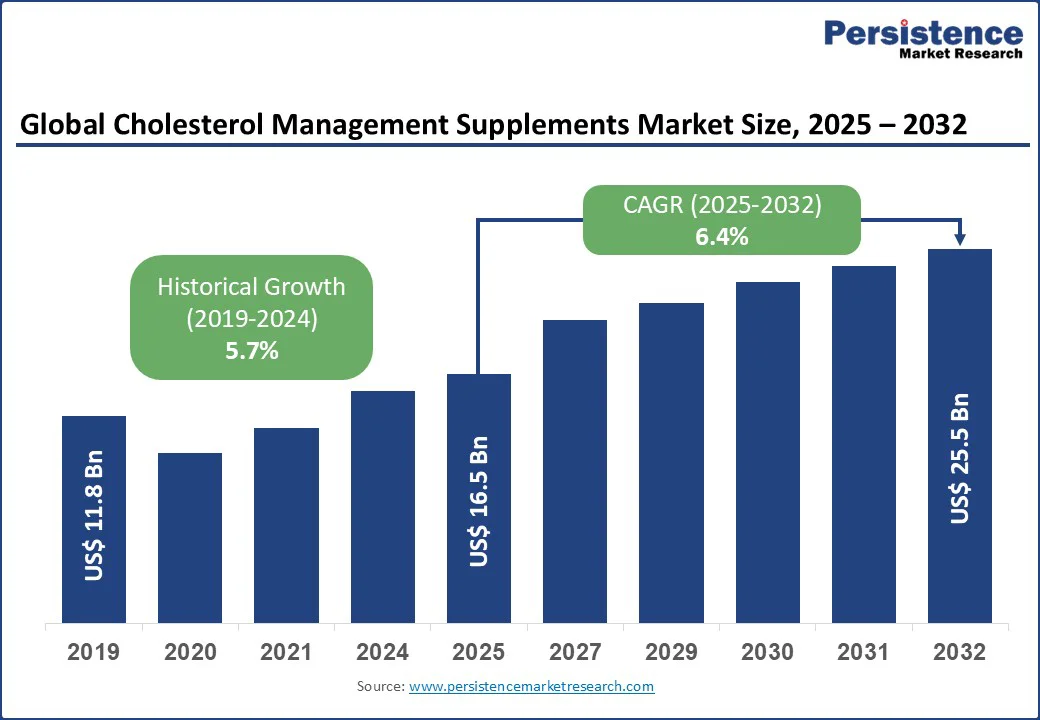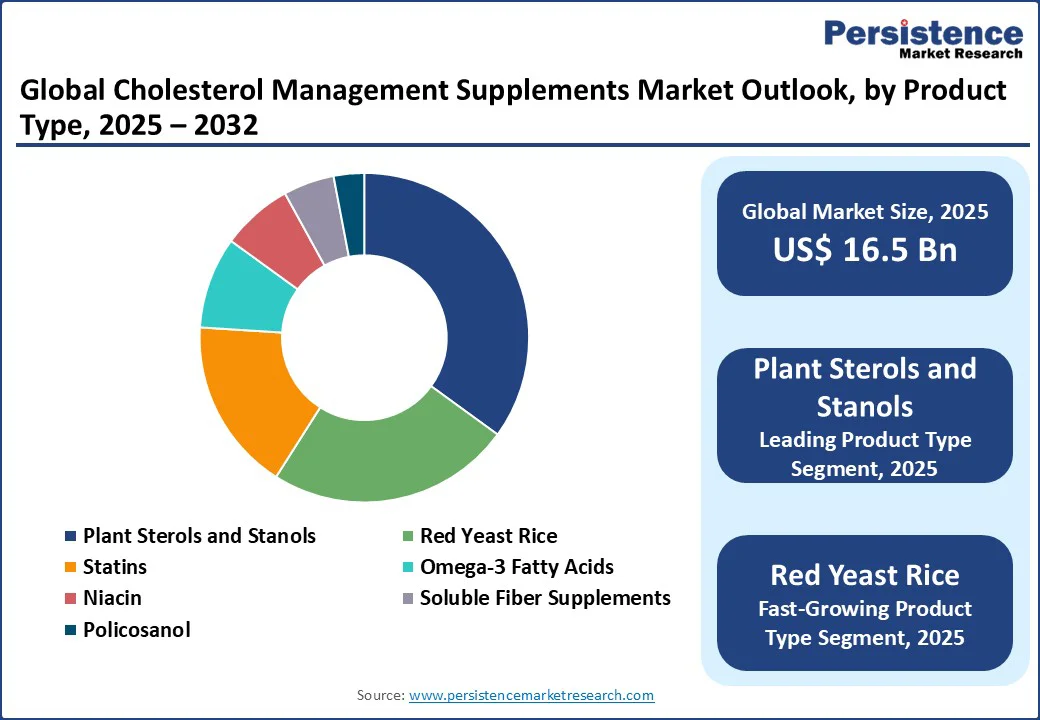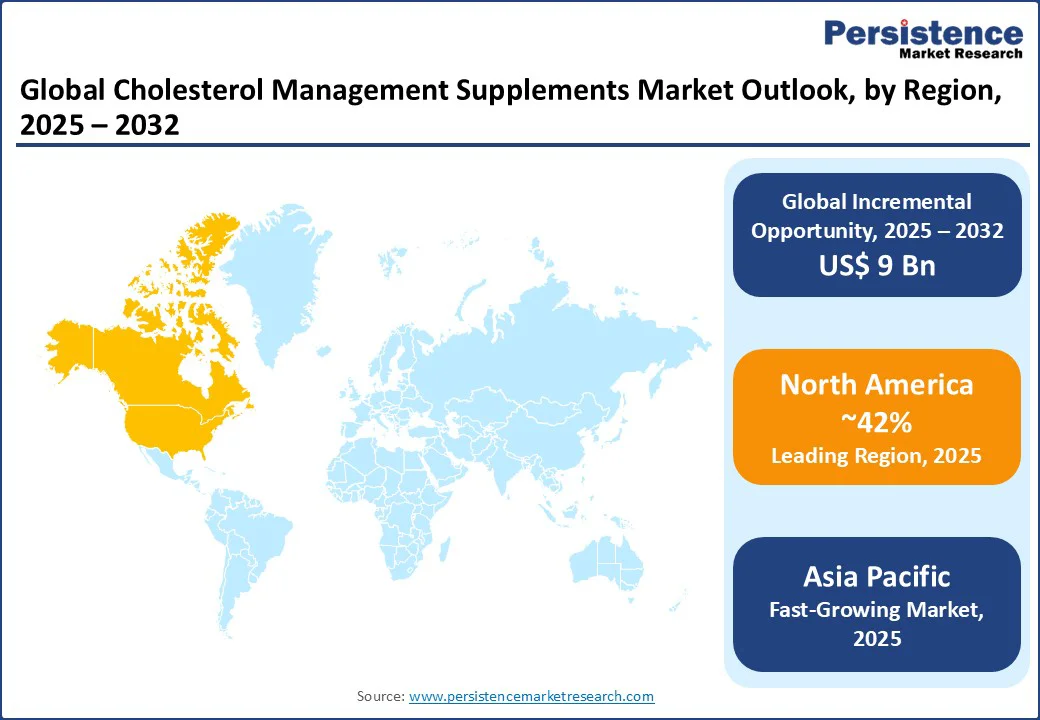ID: PMRREP32732| 181 Pages | 23 Sep 2025 | Format: PDF, Excel, PPT* | Healthcare

The global cholesterol management supplements market size is likely to be valued at US$16.5 Bn by 2025 and is expected to reach US$25.5 Bn by 2032 at a CAGR of 6.4% during the forecast period from 2025 to 2032.
The cholesterol management supplements market is driven by the increasing prevalence of cardiovascular diseases, rising awareness of preventive healthcare, and growing demand for natural and over-the-counter cholesterol-lowering solutions.
Key Industry Highlights:

| Key Insights | Details |
|---|---|
| Cholesterol Management Supplements Market Size (2025E) | US$ 16.5 Bn |
| Market Value Forecast (2032F) | US$ 25.5 Bn |
| Projected Growth (CAGR 2025 to 2032) | 5.7% |
| Historical Market Growth (CAGR 2019 to 2024) | 6.4% |
The rapid growth of the cholesterol management supplements market in the Asia Pacific is primarily driven by rising health awareness and the increasing penetration of e-commerce platforms. Countries such as China and India are witnessing a surge in preventive healthcare adoption, fueled by the rising prevalence of cardiovascular diseases and growing consumer consciousness about managing cholesterol levels.
Consumers are actively seeking natural supplements, such as plant sterols, omega-3 fatty acids, and red yeast rice, to maintain heart health and reduce LDL cholesterol levels. For instance, BY-HEALTH in China offers red yeast rice-based supplements that are widely recommended by health practitioners, while Himalaya Wellness in India promotes omega-3 and plant sterol products to support cardiovascular health.
E-commerce platforms such as Flipkart and Amazon India play a crucial role in making these supplements widely accessible, particularly to tech-savvy, health-conscious populations in urban and semi-urban areas. The convenience of online shopping, combined with product reviews and detailed information, encourages consumers to explore and purchase targeted cholesterol-lowering products.
The expanding middle class, higher disposable incomes, and increasing urbanization further amplify demand for these supplements. Companies such as Streamline Pharma Pvt. Ltd. and TCI Co. Ltd. are leveraging both online and offline distribution channels, including pharmacies and wellness stores, to strengthen market presence. This combination of awareness, accessibility, and proactive health management positions Asia Pacific as the fastest-growing region for cholesterol management supplements globally.
Regulatory challenges and the lack of global standardization for cholesterol management supplements pose significant restraints to market growth. In regions such as North America and Europe, stringent regulatory frameworks enforced by agencies such as the U.S. Food and Drug Administration (FDA) and the European Medicines Agency (EMA) require manufacturers to substantiate health claims, conduct clinical studies, and maintain rigorous quality control. These requirements increase compliance costs and can delay product launches.
For instance, red yeast rice supplements, which naturally contain monacolin K, a statin-such as compound, face varying regulatory limits across Europe. In countries such as France and Germany, only specific concentrations are permitted, which limits manufacturers’ ability to market high-efficacy formulations freely.
In the Asia Pacific, inconsistent quality standards and a lack of uniform guidelines contribute to consumer skepticism regarding the safety and efficacy of supplements. For instance, while companies such as TCI Co. Ltd. in China and HTC Health in the U.K. strive to maintain high-quality products, differences in labeling requirements and ingredient testing across countries complicate cross-border distribution.
Such regulatory complexities increase operational costs, restrict market expansion, and challenge new entrants, making regulatory hurdles and a lack of standardization significant restraints in the cholesterol management supplements market.
The growing adoption of e-commerce platforms presents a significant opportunity for the cholesterol management supplements market. Online retail allows manufacturers and brands to reach a wider audience beyond traditional pharmacies and wellness stores, making products more accessible to urban and semi-urban consumers.
Platforms such as Amazon, Walmart, and iHerb offer extensive product ranges, enabling companies such as Rocktomic and SMPNutra to expand their consumer base. For instance, Rocktomic uses Amazon’s subscription model to provide monthly deliveries of plant sterol and omega-3 supplements, ensuring convenience and consistent use for consumers managing cholesterol. Similarly, SMPNutra leverages Walmart’s online platform to introduce red yeast rice supplements to new customer segments.
Local e-commerce giants such as Alibaba, Tmall, and Flipkart are driving market penetration in the Asia Pacific by offering reliable distribution networks and promotional campaigns.
For instance, TCI Co. Ltd. sells red yeast rice products through Alibaba’s Tmall platform, while Streamline Pharma Pvt. Ltd. offers plant sterols and omega-3 supplements via Flipkart, reaching urban health-conscious consumers effectively. Overall, e-commerce and online retail increase market accessibility, strengthen brand visibility, and enable personalized marketing, making digital channels a key growth driver in the cholesterol management supplements sector.
Plant sterols and stanols hold the largest market share, approximately 35% in 2025, due to their clinically proven ability to lower LDL cholesterol by blocking its absorption in the intestines. Widely incorporated into functional foods and supplements, they are popular among senior citizens and individuals with pre-existing health conditions.
Companies such as Wellna Organix and CitriSafe LLC offer plant sterol-based products, which are favored in North America and Europe for their natural, non-prescription appeal and compliance with heart health guidelines from organizations such as the American Heart Association.
Red yeast rice is the fastest-growing segment, driven by its natural monacolin K content, which mimics the cholesterol-lowering effects of statins. Its popularity is rising in the Asia Pacific, particularly in China, where traditional medicine influences consumer preferences.
The segment’s growth is supported by increasing R&D investments from companies such as TCI Co. Ltd. and Holos Xinhuofong, which focus on improving the potency and safety of red yeast rice formulations to meet regulatory standards in global markets.
Senior citizens account for over 40% of market revenue in 2025, driven by the high prevalence of hypercholesterolemia and cardiovascular risks in aging populations. The global geriatric population is expected to grow, with North America and Europe leading in supplement adoption due to advanced healthcare awareness.
Companies such as Step One Foods and Century Foods provide tailored solutions for seniors, offering easy-to-consume formats such as capsules and powders to support heart health.
Fitness enthusiasts are the fastest-growing segment, propelled by rising health consciousness and the trend of preventive healthcare among younger adults. Companies such as Pure Encapsulations LLC are innovating with targeted products for this demographic, particularly in the urban markets of the Asia Pacific and North America.
Pharmacies and drugstores hold a significant share in 2025, driven by consumer trust in regulated retail environments for purchasing health supplements. Major chains such as CVS and Walgreens in the U.S. and Boots in the U.K. dominate this segment, offering a wide range of cholesterol management supplements.
Companies such as Streamline Pharma Pvt. Ltd. and HTC Health partner with these retailers to ensure product availability in key markets such as North America and Europe.
Online retailers are the fastest-growing distribution channel, fueled by the global rise in e-commerce and consumer preference for convenience.
Online platforms offer competitive pricing, product reviews, and subscription models, driving sales of supplements such as plant sterols and omega-3 fatty acids. In the Asia Pacific, platforms such as JD.com and Amazon India are key growth drivers, with companies such as Rocktomic leveraging digital marketing to capture this segment.

North America holds a dominant position in the global cholesterol management supplements market, accounting for approximately 42% of the global share in 2025. This leadership is primarily driven by high healthcare awareness among consumers and the widespread adoption of dietary and nutritional supplements in the region, particularly in the United States.
The U.S. population increasingly emphasizes preventive healthcare and proactive management of cardiovascular health, given the high prevalence of cholesterol-related disorders. Consumers are inclined toward supplements containing ingredients such as plant sterols, omega-3 fatty acids, and fiber to naturally manage LDL cholesterol levels.
The presence of well-established healthcare infrastructure, strict regulatory frameworks, and organized retail channels such as pharmacies and drugstores further bolsters market growth. The region also benefits from active marketing campaigns and awareness programs conducted by supplement manufacturers and health organizations, educating consumers about the benefits of cholesterol management supplements.
Key companies, including Nature’s Bounty, GNC, and NOW Foods, have strengthened their market presence through product innovation, targeted promotions, and partnerships with healthcare providers. Overall, the combination of health-conscious consumers, robust distribution networks, and strong regulatory support ensures that North America remains the leading and most influential region in the cholesterol management supplements market.
Europe holds a significant share of the cholesterol management supplements market, with leading countries such as Germany, the U.K., and France driving growth. Germany remains at the forefront due to its robust healthcare system, high consumer awareness, and preference for natural cholesterol-lowering ingredients such as plant sterols and red yeast rice.
Consumers increasingly seek preventive health measures, leading to steady demand in retail pharmacies, health stores, and online channels.
In the U.K., government-led initiatives promoting heart health and preventive care contribute to market expansion. Pharmacies such as Boots and healthcare providers actively distribute cholesterol management supplements from companies such as HTC Health, making these products more accessible to a broad consumer base.
France also demonstrates growth, particularly among fitness enthusiasts and health-conscious individuals, who are increasingly adopting omega-3 and other natural supplements to support cardiovascular wellness.
The region benefits from stringent regulatory standards, ensuring product safety, efficacy, and quality. Companies such as Wellna Organix invest in formulations compliant with EU regulations, boosting consumer confidence. Overall, Europe’s combination of strong healthcare infrastructure, health-focused consumer behavior, and regulated supplement markets positions it as a key region for cholesterol management supplement growth.
Asia Pacific is the fastest-growing region in the cholesterol management supplements market, driven primarily by China and India. Rising disposable incomes, increasing prevalence of cardiovascular diseases, and growing health consciousness among consumers are key factors fueling demand. In China, it benefits from the longstanding popularity of red yeast rice, a natural cholesterol-lowering ingredient rooted in traditional medicine.
Companies such as TCI Co. Ltd. dominate, leveraging both offline pharmacies and e-commerce platforms to reach a broad consumer base. In India, growth is supported by increasing awareness of cholesterol management, urbanization, and rapid penetration of e-commerce channels. Platforms such as Flipkart and Amazon India play a vital role in distributing plant sterols, omega-3, and other heart-health supplements, making them more accessible to a tech-savvy, health-conscious population.
The region’s expanding middle class, coupled with rising interest in preventive healthcare, further drives market growth. Companies such as Streamline Pharma Pvt. Ltd. are strengthening their presence by offering targeted formulations through pharmacies, online platforms, and wellness stores. Overall, Asia Pacific’s combination of traditional medicinal practices, modern retail channels, and increasing health awareness positions it as the fastest-growing market for cholesterol management supplements globally.

The global cholesterol management supplements market is highly competitive, comprising both global leaders and specialized regional players. In North America and Europe, companies such as Pure Encapsulations LLC, Wellna Organix, and Holos Xinhuofong lead through strong product portfolios, strategic partnerships, and innovation in natural, plant-based supplements. These firms leverage R&D, eco-friendly packaging, and subscription-based online sales to appeal to health-conscious consumers.
In the Asia Pacific, rapid growth in preventive healthcare awareness and e-commerce adoption is attracting both global and regional players such as TCI Co. Ltd., Streamline Pharma Pvt. Ltd., and Rocktomic. These companies expand distribution through platforms such as Alibaba, Flipkart, and Amazon, as well as traditional pharmacies, to meet rising demand for supplements such as plant sterols, omega-3, and red yeast rice.
Competition is driven by product innovation, digital marketing, and regional expansion strategies. While global leaders dominate advanced formulations, niche and regional players continue to serve emerging markets, creating a fragmented and dynamic market landscape.
The global cholesterol management supplements market is projected to reach US$16.5 billion in 2025.
The rising prevalence of cardiovascular diseases and hypercholesterolemia, coupled with growing awareness of preventive healthcare, are the key market drivers.
The cholesterol management supplements market is poised to witness a CAGR of 6.4% from 2025 to 2032.
The growing adoption of e-commerce and online retail in decentralized healthcare settings is a key market opportunity.
Streamline Pharma Pvt. Ltd., Pure Encapsulations LLC, Step One Foods, TCI Co. Ltd., and HTC Health are key market players.
| Report Attribute | Details |
|---|---|
| Historical Data/Actuals | 2019 - 2024 |
| Forecast Period | 2025 - 2032 |
| Market Analysis | Value: US$ Bn, Volume: As Applicable |
| Geographical Coverage |
|
| Segmental Coverage |
|
| Competitive Analysis |
|
| Report Highlights |
|
By Product Type
By End-use
By Distribution Channel
By Region
Delivery Timelines
For more information on this report and its delivery timelines please get in touch with our sales team.
About Author